Exploring Social and Ethical Issues in Mental Health Services
VerifiedAdded on 2023/03/23
|6
|974
|42
Essay
AI Summary
This essay explores the social and ethical issues within the field of mental health. It begins by defining mental health and its associated treatments, then delves into key social challenges, including stigma and discrimination, particularly regarding gender biases and the underreporting of mental health issues in men, as well as the lack of cultural competence in treatment approaches for diverse ethnic and indigenous communities. The essay also examines ethical dilemmas, such as patient isolation and the infringement on patients' decision-making capacities. It underscores the importance of respecting the rights of individuals with mental health conditions and addressing the unique needs of all cultures and genders in mental health care.

Running head: FIELD OF PRACTICE: MENTAL HEALTH
FIELD OF PRACTICE: MENTAL HEALTH
Name of the Student:
Name of the University:
Author note:
FIELD OF PRACTICE: MENTAL HEALTH
Name of the Student:
Name of the University:
Author note:
Paraphrase This Document
Need a fresh take? Get an instant paraphrase of this document with our AI Paraphraser
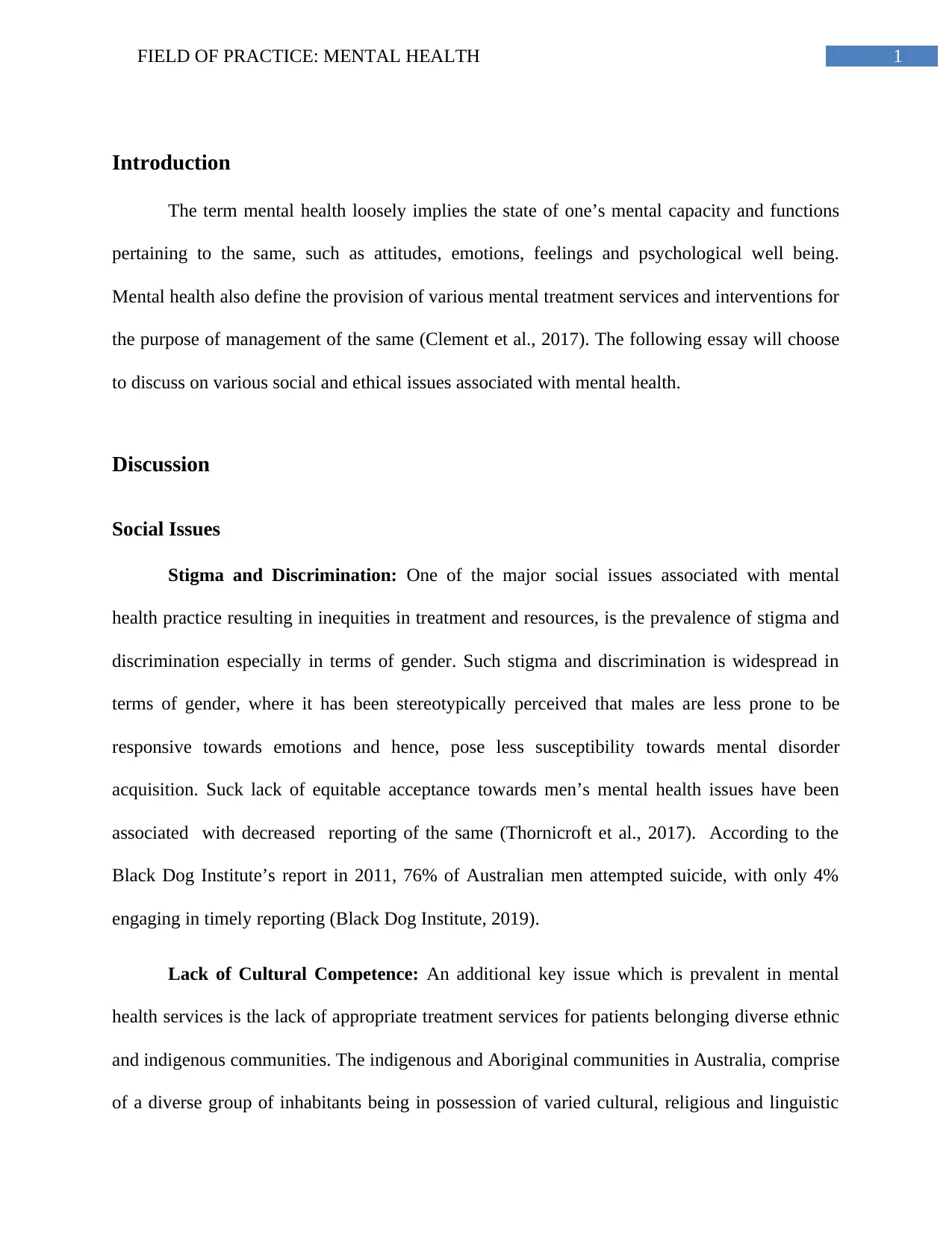
1FIELD OF PRACTICE: MENTAL HEALTH
Introduction
The term mental health loosely implies the state of one’s mental capacity and functions
pertaining to the same, such as attitudes, emotions, feelings and psychological well being.
Mental health also define the provision of various mental treatment services and interventions for
the purpose of management of the same (Clement et al., 2017). The following essay will choose
to discuss on various social and ethical issues associated with mental health.
Discussion
Social Issues
Stigma and Discrimination: One of the major social issues associated with mental
health practice resulting in inequities in treatment and resources, is the prevalence of stigma and
discrimination especially in terms of gender. Such stigma and discrimination is widespread in
terms of gender, where it has been stereotypically perceived that males are less prone to be
responsive towards emotions and hence, pose less susceptibility towards mental disorder
acquisition. Suck lack of equitable acceptance towards men’s mental health issues have been
associated with decreased reporting of the same (Thornicroft et al., 2017). According to the
Black Dog Institute’s report in 2011, 76% of Australian men attempted suicide, with only 4%
engaging in timely reporting (Black Dog Institute, 2019).
Lack of Cultural Competence: An additional key issue which is prevalent in mental
health services is the lack of appropriate treatment services for patients belonging diverse ethnic
and indigenous communities. The indigenous and Aboriginal communities in Australia, comprise
of a diverse group of inhabitants being in possession of varied cultural, religious and linguistic
Introduction
The term mental health loosely implies the state of one’s mental capacity and functions
pertaining to the same, such as attitudes, emotions, feelings and psychological well being.
Mental health also define the provision of various mental treatment services and interventions for
the purpose of management of the same (Clement et al., 2017). The following essay will choose
to discuss on various social and ethical issues associated with mental health.
Discussion
Social Issues
Stigma and Discrimination: One of the major social issues associated with mental
health practice resulting in inequities in treatment and resources, is the prevalence of stigma and
discrimination especially in terms of gender. Such stigma and discrimination is widespread in
terms of gender, where it has been stereotypically perceived that males are less prone to be
responsive towards emotions and hence, pose less susceptibility towards mental disorder
acquisition. Suck lack of equitable acceptance towards men’s mental health issues have been
associated with decreased reporting of the same (Thornicroft et al., 2017). According to the
Black Dog Institute’s report in 2011, 76% of Australian men attempted suicide, with only 4%
engaging in timely reporting (Black Dog Institute, 2019).
Lack of Cultural Competence: An additional key issue which is prevalent in mental
health services is the lack of appropriate treatment services for patients belonging diverse ethnic
and indigenous communities. The indigenous and Aboriginal communities in Australia, comprise
of a diverse group of inhabitants being in possession of varied cultural, religious and linguistic
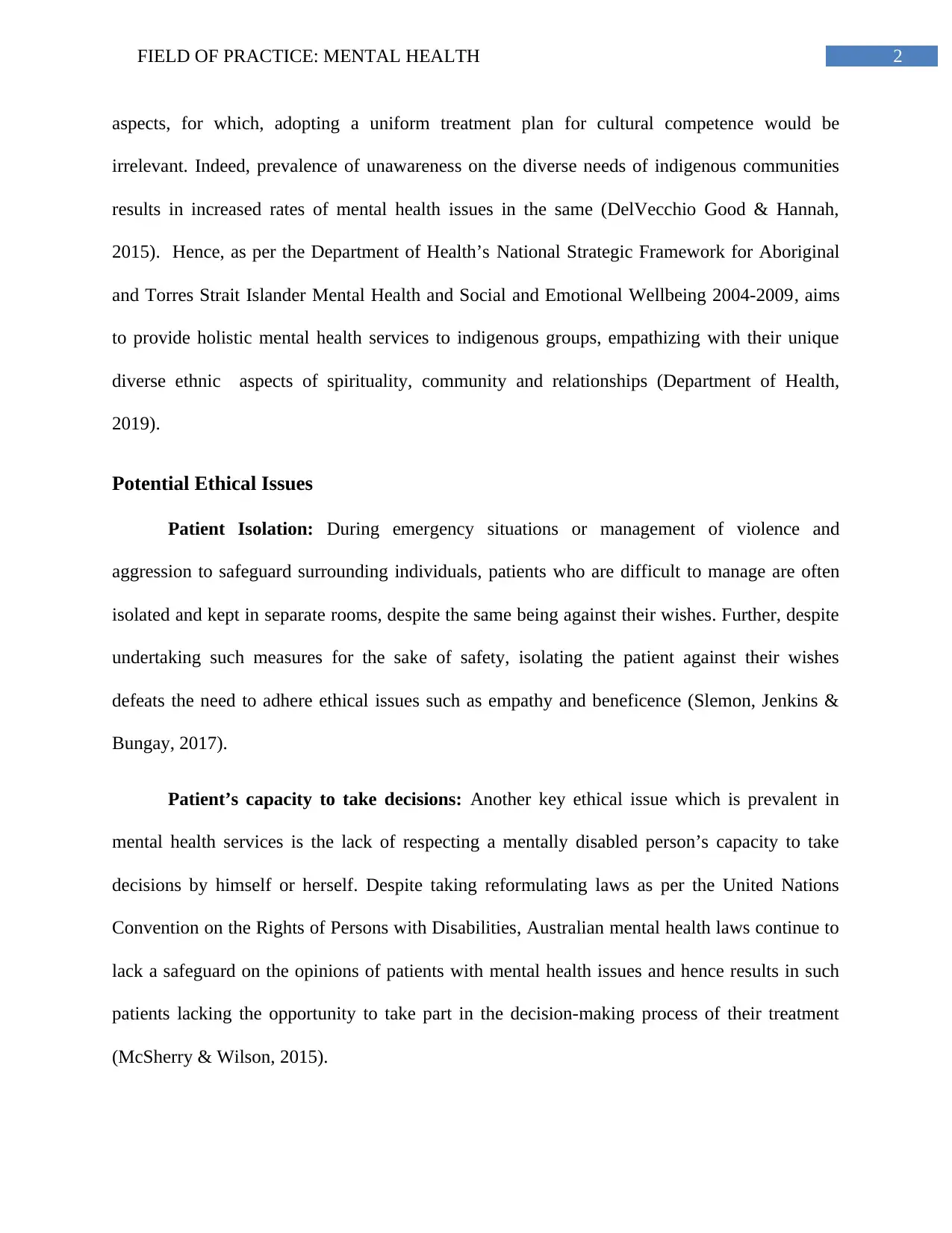
2FIELD OF PRACTICE: MENTAL HEALTH
aspects, for which, adopting a uniform treatment plan for cultural competence would be
irrelevant. Indeed, prevalence of unawareness on the diverse needs of indigenous communities
results in increased rates of mental health issues in the same (DelVecchio Good & Hannah,
2015). Hence, as per the Department of Health’s National Strategic Framework for Aboriginal
and Torres Strait Islander Mental Health and Social and Emotional Wellbeing 2004-2009, aims
to provide holistic mental health services to indigenous groups, empathizing with their unique
diverse ethnic aspects of spirituality, community and relationships (Department of Health,
2019).
Potential Ethical Issues
Patient Isolation: During emergency situations or management of violence and
aggression to safeguard surrounding individuals, patients who are difficult to manage are often
isolated and kept in separate rooms, despite the same being against their wishes. Further, despite
undertaking such measures for the sake of safety, isolating the patient against their wishes
defeats the need to adhere ethical issues such as empathy and beneficence (Slemon, Jenkins &
Bungay, 2017).
Patient’s capacity to take decisions: Another key ethical issue which is prevalent in
mental health services is the lack of respecting a mentally disabled person’s capacity to take
decisions by himself or herself. Despite taking reformulating laws as per the United Nations
Convention on the Rights of Persons with Disabilities, Australian mental health laws continue to
lack a safeguard on the opinions of patients with mental health issues and hence results in such
patients lacking the opportunity to take part in the decision-making process of their treatment
(McSherry & Wilson, 2015).
aspects, for which, adopting a uniform treatment plan for cultural competence would be
irrelevant. Indeed, prevalence of unawareness on the diverse needs of indigenous communities
results in increased rates of mental health issues in the same (DelVecchio Good & Hannah,
2015). Hence, as per the Department of Health’s National Strategic Framework for Aboriginal
and Torres Strait Islander Mental Health and Social and Emotional Wellbeing 2004-2009, aims
to provide holistic mental health services to indigenous groups, empathizing with their unique
diverse ethnic aspects of spirituality, community and relationships (Department of Health,
2019).
Potential Ethical Issues
Patient Isolation: During emergency situations or management of violence and
aggression to safeguard surrounding individuals, patients who are difficult to manage are often
isolated and kept in separate rooms, despite the same being against their wishes. Further, despite
undertaking such measures for the sake of safety, isolating the patient against their wishes
defeats the need to adhere ethical issues such as empathy and beneficence (Slemon, Jenkins &
Bungay, 2017).
Patient’s capacity to take decisions: Another key ethical issue which is prevalent in
mental health services is the lack of respecting a mentally disabled person’s capacity to take
decisions by himself or herself. Despite taking reformulating laws as per the United Nations
Convention on the Rights of Persons with Disabilities, Australian mental health laws continue to
lack a safeguard on the opinions of patients with mental health issues and hence results in such
patients lacking the opportunity to take part in the decision-making process of their treatment
(McSherry & Wilson, 2015).
⊘ This is a preview!⊘
Do you want full access?
Subscribe today to unlock all pages.

Trusted by 1+ million students worldwide
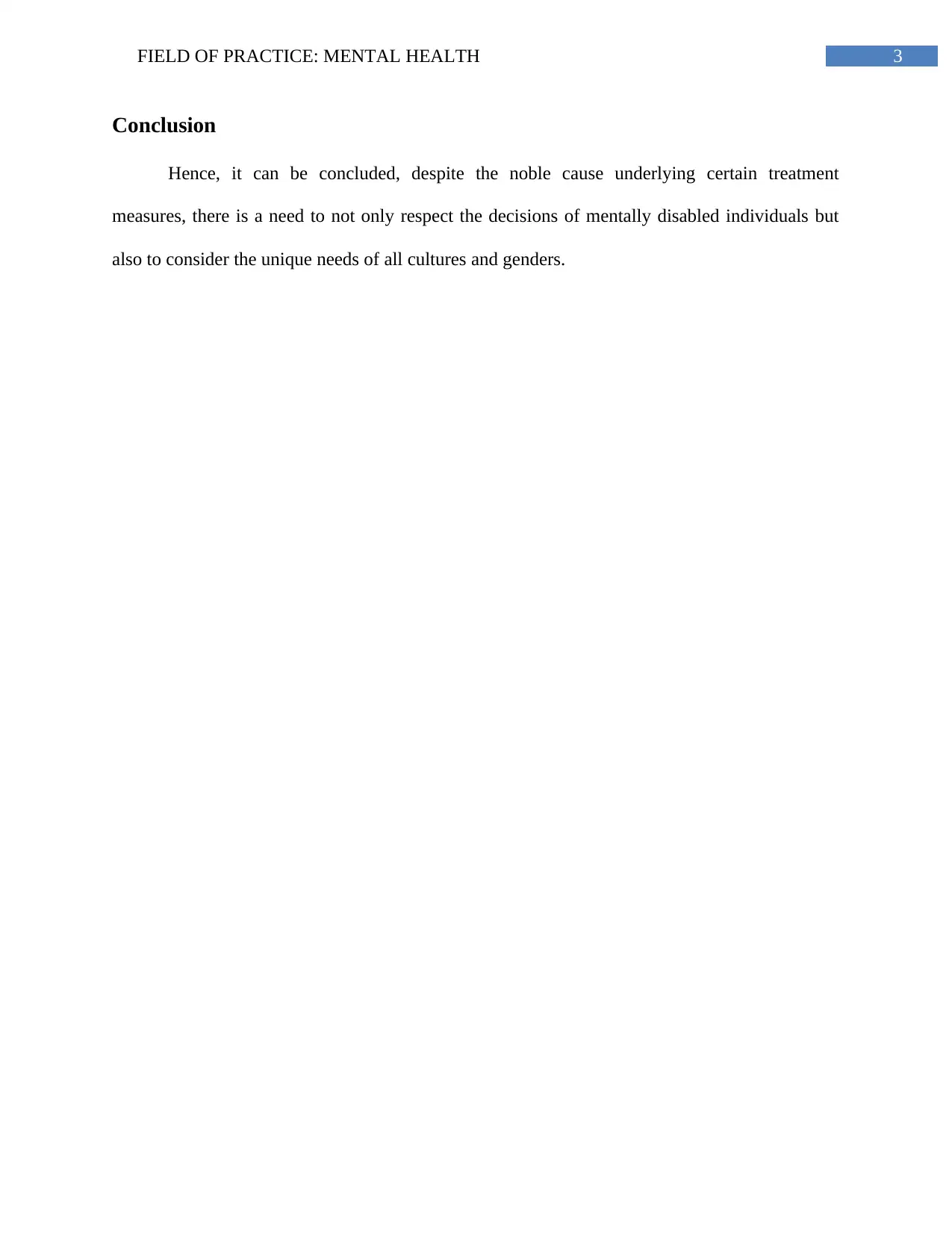
3FIELD OF PRACTICE: MENTAL HEALTH
Conclusion
Hence, it can be concluded, despite the noble cause underlying certain treatment
measures, there is a need to not only respect the decisions of mentally disabled individuals but
also to consider the unique needs of all cultures and genders.
Conclusion
Hence, it can be concluded, despite the noble cause underlying certain treatment
measures, there is a need to not only respect the decisions of mentally disabled individuals but
also to consider the unique needs of all cultures and genders.
Paraphrase This Document
Need a fresh take? Get an instant paraphrase of this document with our AI Paraphraser
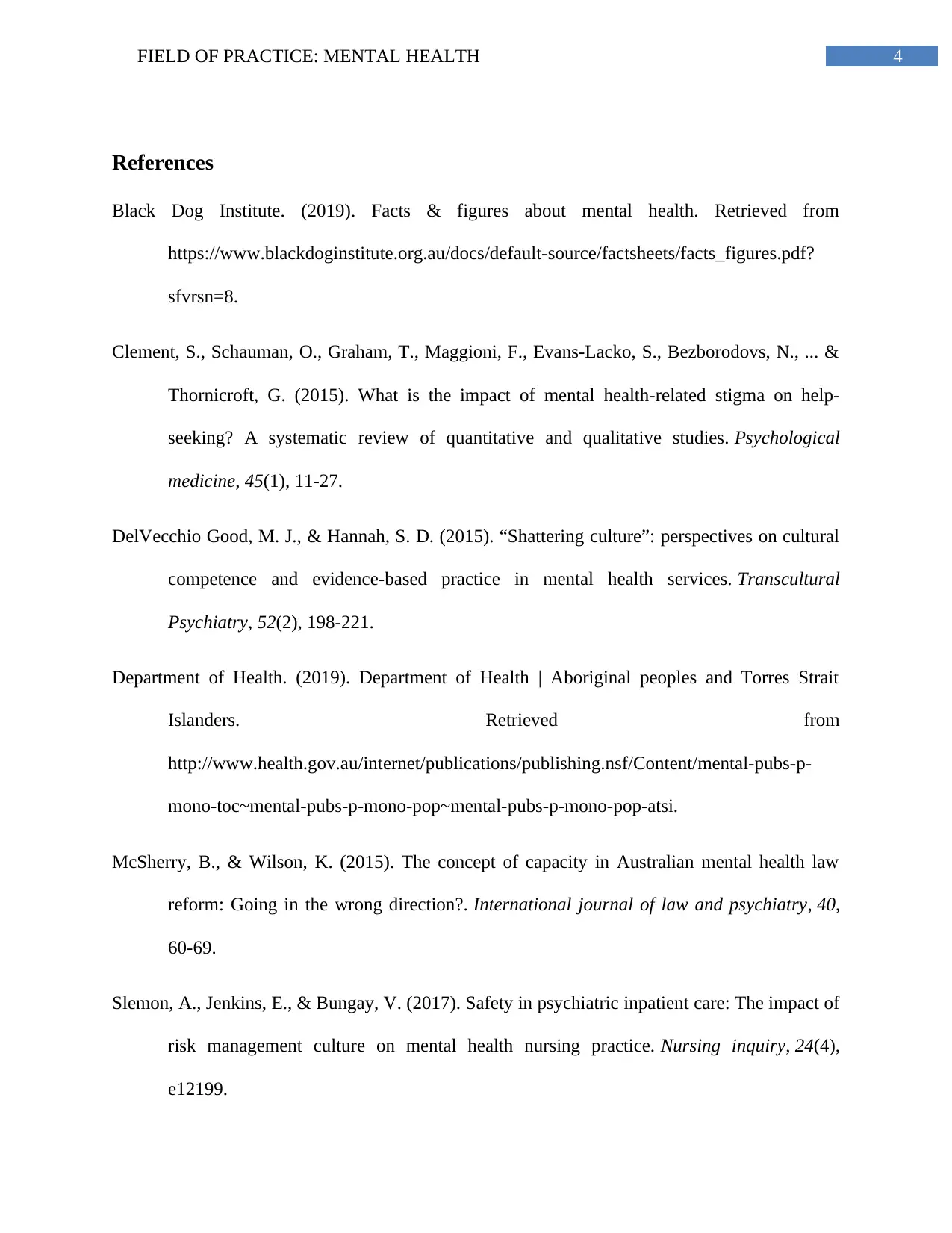
4FIELD OF PRACTICE: MENTAL HEALTH
References
Black Dog Institute. (2019). Facts & figures about mental health. Retrieved from
https://www.blackdoginstitute.org.au/docs/default-source/factsheets/facts_figures.pdf?
sfvrsn=8.
Clement, S., Schauman, O., Graham, T., Maggioni, F., Evans-Lacko, S., Bezborodovs, N., ... &
Thornicroft, G. (2015). What is the impact of mental health-related stigma on help-
seeking? A systematic review of quantitative and qualitative studies. Psychological
medicine, 45(1), 11-27.
DelVecchio Good, M. J., & Hannah, S. D. (2015). “Shattering culture”: perspectives on cultural
competence and evidence-based practice in mental health services. Transcultural
Psychiatry, 52(2), 198-221.
Department of Health. (2019). Department of Health | Aboriginal peoples and Torres Strait
Islanders. Retrieved from
http://www.health.gov.au/internet/publications/publishing.nsf/Content/mental-pubs-p-
mono-toc~mental-pubs-p-mono-pop~mental-pubs-p-mono-pop-atsi.
McSherry, B., & Wilson, K. (2015). The concept of capacity in Australian mental health law
reform: Going in the wrong direction?. International journal of law and psychiatry, 40,
60-69.
Slemon, A., Jenkins, E., & Bungay, V. (2017). Safety in psychiatric inpatient care: The impact of
risk management culture on mental health nursing practice. Nursing inquiry, 24(4),
e12199.
References
Black Dog Institute. (2019). Facts & figures about mental health. Retrieved from
https://www.blackdoginstitute.org.au/docs/default-source/factsheets/facts_figures.pdf?
sfvrsn=8.
Clement, S., Schauman, O., Graham, T., Maggioni, F., Evans-Lacko, S., Bezborodovs, N., ... &
Thornicroft, G. (2015). What is the impact of mental health-related stigma on help-
seeking? A systematic review of quantitative and qualitative studies. Psychological
medicine, 45(1), 11-27.
DelVecchio Good, M. J., & Hannah, S. D. (2015). “Shattering culture”: perspectives on cultural
competence and evidence-based practice in mental health services. Transcultural
Psychiatry, 52(2), 198-221.
Department of Health. (2019). Department of Health | Aboriginal peoples and Torres Strait
Islanders. Retrieved from
http://www.health.gov.au/internet/publications/publishing.nsf/Content/mental-pubs-p-
mono-toc~mental-pubs-p-mono-pop~mental-pubs-p-mono-pop-atsi.
McSherry, B., & Wilson, K. (2015). The concept of capacity in Australian mental health law
reform: Going in the wrong direction?. International journal of law and psychiatry, 40,
60-69.
Slemon, A., Jenkins, E., & Bungay, V. (2017). Safety in psychiatric inpatient care: The impact of
risk management culture on mental health nursing practice. Nursing inquiry, 24(4),
e12199.
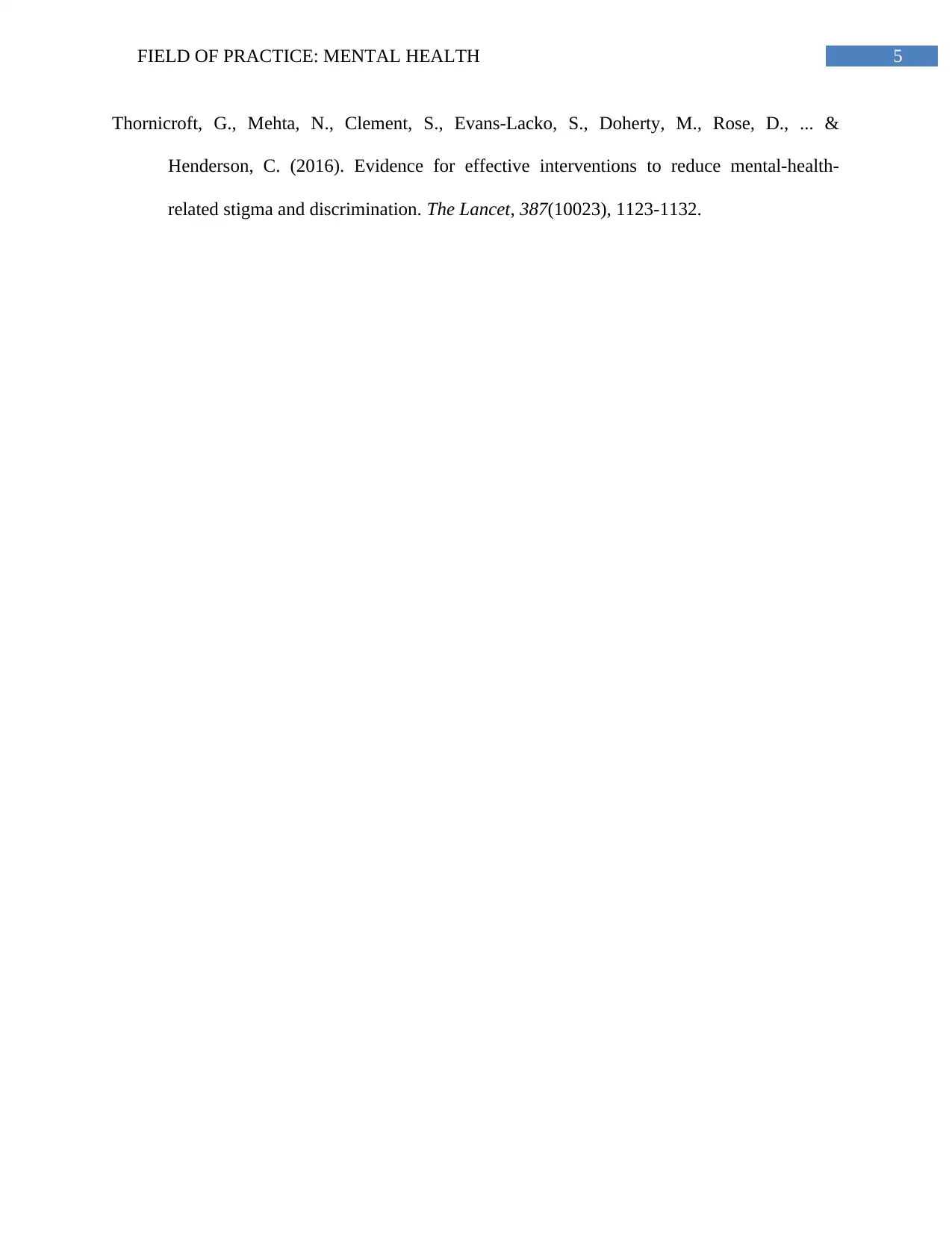
5FIELD OF PRACTICE: MENTAL HEALTH
Thornicroft, G., Mehta, N., Clement, S., Evans-Lacko, S., Doherty, M., Rose, D., ... &
Henderson, C. (2016). Evidence for effective interventions to reduce mental-health-
related stigma and discrimination. The Lancet, 387(10023), 1123-1132.
Thornicroft, G., Mehta, N., Clement, S., Evans-Lacko, S., Doherty, M., Rose, D., ... &
Henderson, C. (2016). Evidence for effective interventions to reduce mental-health-
related stigma and discrimination. The Lancet, 387(10023), 1123-1132.
⊘ This is a preview!⊘
Do you want full access?
Subscribe today to unlock all pages.

Trusted by 1+ million students worldwide
1 out of 6
Related Documents
Your All-in-One AI-Powered Toolkit for Academic Success.
+13062052269
info@desklib.com
Available 24*7 on WhatsApp / Email
![[object Object]](/_next/static/media/star-bottom.7253800d.svg)
Unlock your academic potential
Copyright © 2020–2026 A2Z Services. All Rights Reserved. Developed and managed by ZUCOL.



